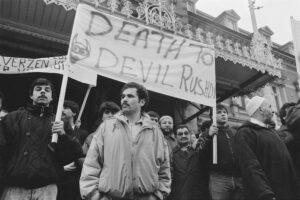Integration and its discontents in Belgium
By Khaled Diab
Are religious immigrants within their rights to boycott an ‘unspeakable' integration course in Belgium?
17 February 2009
Experiencing some level of culture shock is part and parcel of moving to a new country. But for a group of recent immigrants to Belgium's second city, Antwerp, the shock was so severe that they refused to continue their ‘integration' lessons.
The reason for their outrage was the “unspeakable” nature of some of the content of their introduction to Belgian society: abortion, gay marriage, homosexuality, sex, etc. To top it all off, their horror was completed by the fact that their teacher was a woman.
The group and its religious leaders charge that the authorities are being insensitive to their religious sensibilities, while the government insists that if people are going to make the country their home, they need to learn about its values.
While it is Muslims who are at the centre of the ‘integration' controversy in Europe, this particular case relates to Hasidic Jews. Following a letter from a group of Hasidic rabbis urging their followers not to move to Belgium until the offending content was removed from the integration courses, their followers already taking the courses have walked out of class.
In no mood to make exceptions, the Flemish minister of integration, Marino Keulen, has threatened to fine those who refuse to return. And the position of these orthodox Jews has caused unease among their secular coreligionists. “I think it's ridiculous. These guys are living in another world and another time,” a Jew I know from Antwerp said. “They make no effort to get involved in society. They are even against Jews like me who are not conservative. They live in a ghetto.”
And therein lies the rub. How do you go about integrating a counter-cultural movement? Like similar fundamentalist religious sects in Islam and Christianity, the Hasidim were founded on the idea of abandoning mainstream society.
The movement, whose name derives from the Hebrew for ‘piety', began in the 18th century in Poland, Hungary and the Ukraine – and that is why their dress looks like a fossil from a disappeared eastern European world. In the early 20th century, Hasidism, in the hands of the German Martin Buber, became more popular in western Europe as a ‘Jewish renaissance'. This was a direct reaction to the total assimilation of secular German Jews, and the power exerted on Jews to abandon their traditions and culture.
Of course, this kind of self-imposed ghettoisation is not what enriches a multicultural society, but society is also impoverished by excessive conformist pressures. As a secular liberal with progressive ideas, I find much of the worldview of extremists of any religious persuasion to be outdated, intolerant and reactionary – I also find their self-righteous rejection of the rest of us incredibly irritating. But their ideas will only change through dialogue not ostracisation.
Although I would love to live in a society where everyone was tolerant and enlightened, part of being open-minded is to believe in freedom of belief for everyone – as long as they don't break the law. Of course, the dilemma is that extremists often do not believe in extending us liberals the same courtesy.
For years, I have had misgivings about this fixation on integration – and the full assimilation demanded by the far right. For instance, the extremist Vlaams Belang party – whose centre of gravity happens to be Antwerp – insists that immigrants must “adapt to our culture, our norms and values” and if they don't, they should be deported. Aside from the absence of expletives, this echoes the “Oi Paki” brand of thugs who regularly invited the younger me to go back where I came from.
But what “norms and values” precisely? After all, many of the party's own moral positions have far more in common with the conservative immigrants it vilifies than with the mainstream. For instance, the VB is against abortion and believes that homosexuals should stay out of the public sphere.
Of course, that doesn't mean that assisting immigrants to adapt to their new homes is necessarily a bad thing. “I think integration courses are positive, as long as they guide newcomers and help them understand the system,” my Jewish friend noted.
I agree. Language and cultural courses can help new arrivals get their bearings more quickly. However, it is when they become an ideological weapon, rather than a practical tool, that problems arise.
For instance, the Netherlands actually demands that would-be immigrants sit an ‘integration test' before they even set foot in the country, which Human Rights Watch describes as “discriminatory”.
Another challenge with such examinations is what exactly do you test for? In addition to language skills, the Dutch system tests the immigrant's basic knowledge of Dutch society. But is it fair to expect immigrants to know what much of the indigenous population does not?
Many natives are not aware of, for example, the basic division of powers in a democracy nor the ministers in their governments. One hilarious example of this came from a politician. The former Belgian prime minister, Yves Leterme, was asked to sing the Belgian national anthem and instead launched into a rendition of the more memorable La Marseillaise from neighbouring France.
The true measure of ‘integration' should be how well people respect their fellow citizens' freedom, abide by a country's laws and live as productive and useful members of society. What people believe and do in private, and how they dress is their own business.
This column appeared in The Guardian Unlimited's Comment is Free section on 10 February 2009. Read the related discussion.



Pingback: Moor or less Belgians - The Chronikler
Pingback: Belgium and the integration placebo - The Chronikler